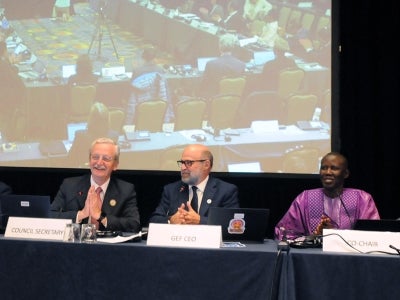Overview
The Agreement under the United Nations Convention on the Law of the Sea on the conservation and sustainable use of marine biological diversity of areas beyond national jurisdiction (BBNJ Agreement) was adopted on June 19, 2023 by the Intergovernmental Conference on Marine Biodiversity of Areas Beyond National Jurisdiction convened under the auspices of the United Nations. The BBNJ Agreement is the third implementing agreement to the United Nations Convention on the Law of the Sea (UNCLOS).
The main objective of the BBNJ Agreement is the conservation and sustainable use of marine biological diversity of areas beyond national jurisdiction for the present and in the long-term, through effective implementation of the relevant provisions of UNCLOS and further international cooperation and coordination. The BBNJ Agreement consists of the following four pillars as well as cross-cutting issues:
- Marine genetic resources, including the fair and equitable sharing of benefits;
- Measures such as area-based management tools, including marine protected areas;
- Environmental impact assessments; and
- Capacity-building and the transfer of marine technology.
The BBNJ Agreement also establishes a funding mechanism and sets up institutional arrangements, including a Conference of the Parties and various subsidiary bodies, a Clearing-House Mechanism, and a secretariat.
The BBNJ Agreement is open for signature by all states and regional economic integration organizations from Sept. 20, 2023 to Sept. 20, 2025, and will enter into force 120 days after the date of deposit of the 60th instrument of ratification, approval, acceptance, or accession. The current status of the BBNJ Agreement can be found at the United Nations Treaty Collection website.
Role of the GEF
The BBNJ Agreement identifies the GEF Trust Fund as part of its financial mechanism, which also includes a special fund and a voluntary trust fund. In August 2023, the Seventh GEF Assembly approved by consensus the corresponding amendment to the Instrument to add the BBNJ Agreement to the list of conventions served by the Global Environment Facility. GEF Council Decision 14/2023 also authorized the use of up to $34 million from the GEF-8 international waters focal area for the funding of ratification support and early action activities for the BBNJ Agreement.
GEF Council Decision 14/2024 approved Council document GEF/C.66/07 that articulated the initial guidelines for enabling activities and ratification support projects to promote early entry into force and implementation readiness for the BBNJ Agreement. The document was developed in close consultation with the Division for Ocean Affairs and the Law of the Sea (DOALOS) of the Office of Legal Affairs of the United Nations, which serves as the temporary secretariat.
DOALOS and the GEF Secretariat are working closely to ensure coordination of efforts and the efficient use of resources by avoiding gaps and duplications in the delivery of assistance. In this regard, DOALOS and the GEF Secretariat have conducted an initial survey of capacity-building and technical assistance needs, including with regard to making progress towards signature and ratification, approval, acceptance, or accession, to inform the development of future assistance in support of becoming parties to the BBNJ Agreement and fostering readiness to implementing it. The compilation of results of the initial survey is available here.
The GEF Secretariat sent a communication to all GEF Operational Focal Points on March 8, 2024 to inform that GEF-8 funding is available for BBNJ ratification support and implementation readiness activities. It further explains that the GEF Secretariat has identified a consortium of three GEF agencies - the Food and Agriculture Organization (FAO), the United Nations Development Programme (UNDP), and the United Nations Environment Programme (UNEP) - to provide support in line with GEF/C.66/07. Such support will be closely coordinated and implemented in collaboration with DOALOS. Countries may choose between FAO, UNDP, or UNEP for receiving national umbrella Enabling Activity support. GEF Operational Focal Points are encouraged to contact FAO, UNDP, or UNEP to promptly begin the process of accessing such support.
Questions to the GEF Secretariat can be directed to: Andrew Hume (ahume@thegef.org), Jurgis Sapijanskas (jsapijanskas@thegef.org), and Taylor Henshaw (thenshaw@thegef.org)
Key Documents
- GEF/C.64/12/Rev.02 (June 2023) - Preparing the GEF to serve as part of the financial mechanism of the international legally binding instrument under the United Nations Convention on the Law of the Sea on the conservation and sustainable use of marine biological diversity of Areas Beyond National Jurisdiction (BBNJ)
- GEF/A.7/08 (August 2023) - Amendment of GEF Instrument to include BBNJ Agreement
- GEF C.66/07 (February 2024) - Initial guidelines for enabling activities and ratification support projects for the agreement under the United Nations Convention on the Law of the Sea on the conservation and sustainable use of marine biological diversity of Areas Beyond National Jurisdiction (BBNJ)


